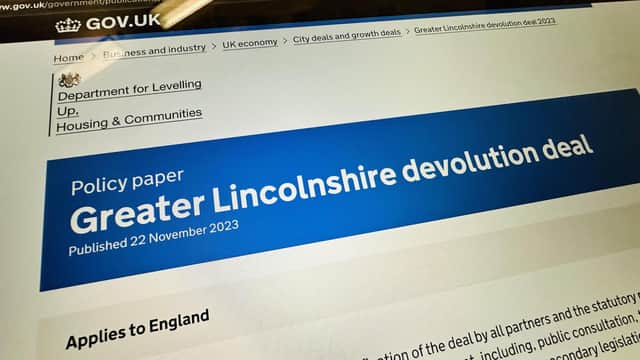Greater Lincolnshire Devolution: New Mayor will have limited independence


As part of the devolution deal announced for Greater Lincolnshire, a directly-elected mayor is poised to play a pivotal role.
This mayor, while influential, will be part of a broader governance framework – the Mayoral Combined County Authority (MCCA), which includes Lincolnshire County Council, North Lincolnshire Council, and North East Lincolnshire Council.
Advertisement
Advertisement
While the Mayor will have the autonomy to make certain calls, such as setting a mayoral budget and imposing a business rate supplement, a significant number of decisions will require a collective vote within the Mayoral Combined County Authority.
This ensures that while the mayor has independent powers, the broader governance framework requires collaborative decision-making for most actions.
Documents set before Lincolnshire County Council’s Overview and Scrutiny Management Board next Thursday have revealed some of the key thinking behind the plans for governance.
By empowering the mayor with significant responsibilities yet ensuring decisions are not made in isolation, the structure looks to blend independent authority with collaborative oversight.
Independent powers and collective decision-making
Advertisement
Advertisement
The proposed mayor will have considerable autonomous powers, such as setting budgets, imposing business rate supplements, providing relief from non-domestic rates, and overseeing planning functions.
Additionally, they hold the potential to issue a precept on local council tax bills, solely for mayoral functions.
However, their autonomy is not absolute.
Many significant decisions will necessitate a collective vote within the MCCA, reflecting a commitment to shared decision-making and collaboration.
For some key decisions within the MCCA, a two-thirds majority vote is required. This includes amending the Mayor’s budget and transport strategy.
Composition and voting in the MCCA
Advertisement
Advertisement
The MCCA will consist of seven main members, expected to include the mayor, leaders of the three upper-tier authorities, and their substitutes.
Additionally, six “non-constituent” and associate members will be involved, with district councils having four representatives on the board.
However, these district council representatives will not have voting rights on all matters.
On top of this, there will be seats at the table for a Police and Crime Commissioner representative and a further representative appointed by the MCCA.
Advertisement
Advertisement
Examples of the varying level of autonomy the position has, include that the Mayor has the power to impose a supplementary levy on non-domestic ratepayers to fund projects promoting economic development.
Meanwhile, both the Mayor and MCCA are involved in providing safe, integrated, efficient, and economic transport options. For example, during the transition period, decisions regarding local transport plans will require a unanimous vote.
Functions like promoting tourism and managing public information involve collaboration between the Mayor, MCCA, and district councils.
In these areas, district councils have voting rights, allowing them to participate actively in decision-making.
Advertisement
Advertisement
However, when considering economic development and regeneration functions, the Mayor and MCCA have the power to borrow for purposes relevant to their functions.
While this includes engagement with constituent councils, city, district, and borough councils, these non-constituent members do not have voting rights when it comes to decisions related to borrowing for these specific functions.
Financial considerations and shadow authority
The establishment of this new governing body comes with a financial commitment of around £2 million.
A ‘shadow MCCA’ is also proposed to facilitate the transition to the new authority until the Mayoral elections in 2025.
Advertisement
Advertisement
The shadow MCCA, while not a legally constituted body, will consist of individuals from existing councils, selected by the upper-tier authorities.
Its role is to provide guidance and oversight during the transition to the new authority, ensuring a smooth and effective implementation of the devolution deal.
Staffing structure
The mayor has the power to set a precept on council tax to fund mayoral functions.
The MCCA will require statutory officers (Head of Paid Service, Chief Finance Officers, Monitoring Officers), officers for core functions (transport, planning, regeneration), and support services (commissioning, policy development, finance, human resources, technology, etc.).
While these roles may not be directly employed by the MCCA, there will be options for hiring or contracting staff as necessary.